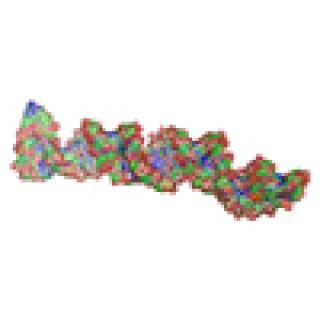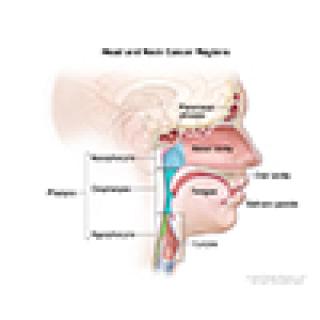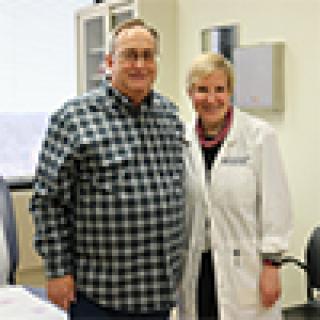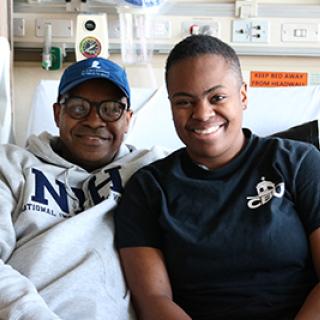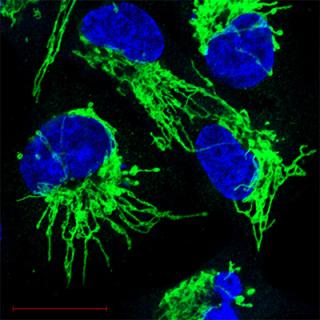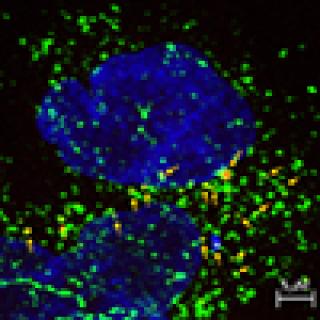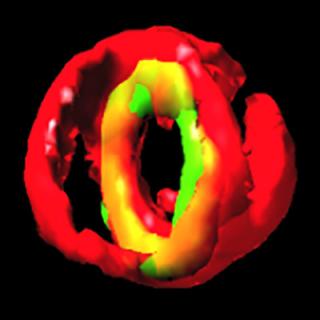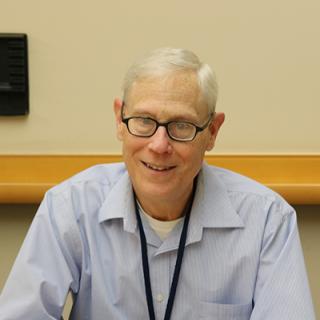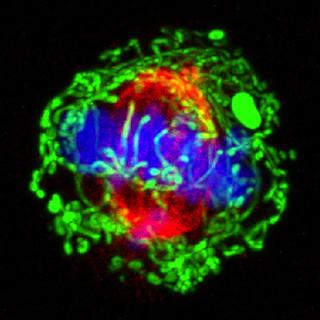News and Events
Proteins Released from the Nuclei of Dying Cancer Cells Promote Tumor Growth
Material released from dying cancer cells, known as tumor cell nuclear expulsion products (TuNEPs), contains specific proteins that promote the growth of neighboring cancer cells. Targeting these proteins could lead to new treatments that hinder cancer spread and improve patient outcomes.
Read MoreBacterial compound targets cancer-promoting RNA
Screening more than 3,000 natural products identified a compound that stops the growth of cancer cells by targeting a growth-promoting microRNA.
Read MoreInvestigators test combination therapy for head and neck squamous cell carcinoma in new trial
Patients with recurrent head and neck squamous cell carcinoma (HNSCC) may be eligible to participate in a new clinical trial at the NIH Clinical Center. This trial tests a therapy of a novel radiosensitizer, birinapant, in combination with radiotherapy for patients whose HNSCC has come back at or near the place of the original tumor.
Read MoreA patient’s 10-year journey to moxetumomab for hairy cell leukemia
Randy, a father, husband, engineering quality consultant and lifelong “Motor City” resident, was diagnosed with hairy cell leukemia in 1998 at the age of 41. After participation in a clinical trial at the NIH Clinical Center, his body has shown a complete response to the drug moxetumomab pasudotox, which was developed at the National Cancer Institute’s Center for Cancer Research.
Read MoreFrom father to daughter: A bone marrow transplant for GATA2 deficiency
James and Jahleel are a father-daughter duo from Tennessee who came to NIH for Jahleel’s bone marrow transplant. Jahleel was diagnosed with GATA2 deficiency, a rare genetic disease that causes a wide range of symptoms, including myeloid leukemias.
Read MoreProtein mutations lead to human disease by altering a cancer-promoting pathway
Working in collaboration with a team of other scientists, CCR researchers identified the role that the LZTR1 protein plays in disrupting the RAS pathway. It interferes with signaling, largely by dysregulating ubiquitination, a process defined as the attachment of a small protein called ubiquitin to a protein that is degraded by an enzyme.
Read MoreNew therapies tested in mice provide a one-two punch for treating liver cancer
Biopharmaceutical agents that combine the precision of cancer-specific antibodies and the potency of drugs toxic to harmful cells are increasingly being used to treat cancer. A team in CCR has identified two such agents for liver cancer, which were both found to reduce tumor size and prolong survival in mice.
Read MoreStudy reveals function of protein crucial to survival of Staph infections
A team led by Kumaran Ramamurthi, Ph.D.,Senior Investigator in the Laboratory of Molecular Biology, has identified why the GpsB protein is essential for the survival of Staphylococcus aureus, a leading source of infection in cancer patients in hospital settings. These findings, published in eLife, point to GpsB as a possible antibiotic target.
Read MoreStudy reveals regions where harmful DNA breaks are most likely to occur
Center for Cancer Research investigators have discovered that double-strand DNA breaks—the most dangerous form of DNA damage, which can lead to cancer—tend to occur during DNA replication at regions known as poly(dA:dT) tracts. Their findings represent a first step toward investigating ways to prevent these harmful DNA breaks.
Read MoreProstate cancer journey leads to immunotherapy
A 14-year battle with metastatic castration-resistant prostate cancer led Tom to the doors of the NIH Clinical Center. A combination immunotherapy clinical trial led by James Gulley, M.D., Ph.D., turned the tide in his fight and led to a passion for advising prostate cancer patients.
Read MoreCommitting to cell division may be clue to cancer cell growth
In a new study in Nature, CCR researchers describe, for the first time, how a cell commits to dividing during the cell cycle. Since cancer cells divide when they should not, targeting this pathway might stop their inappropriate growth.
Read More
